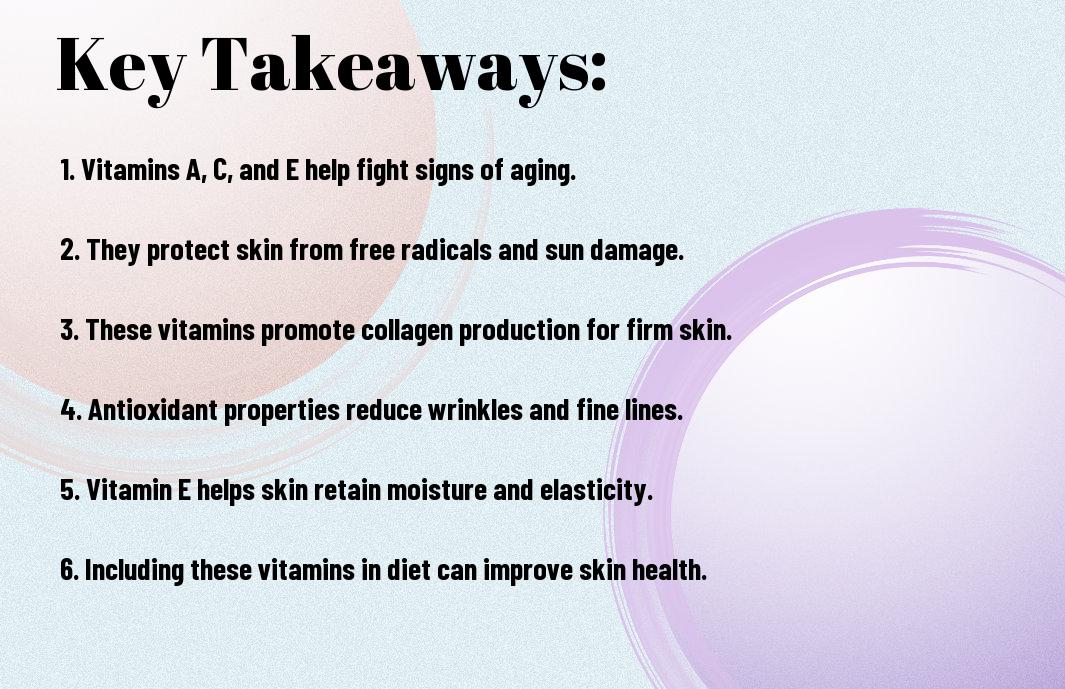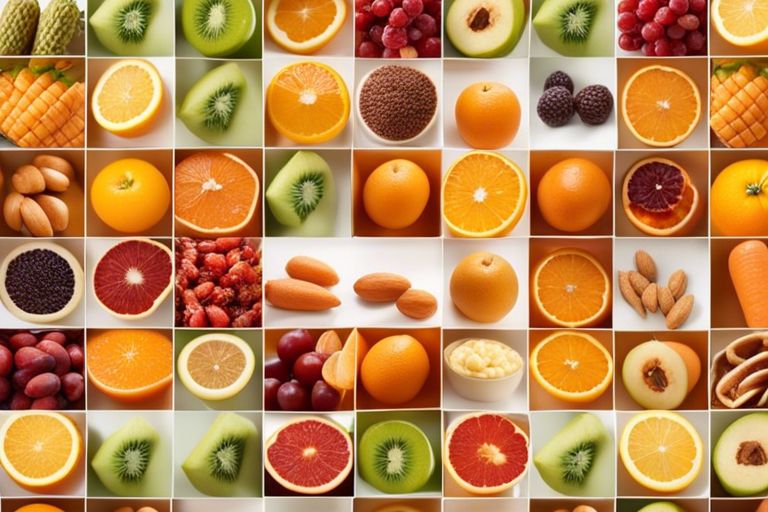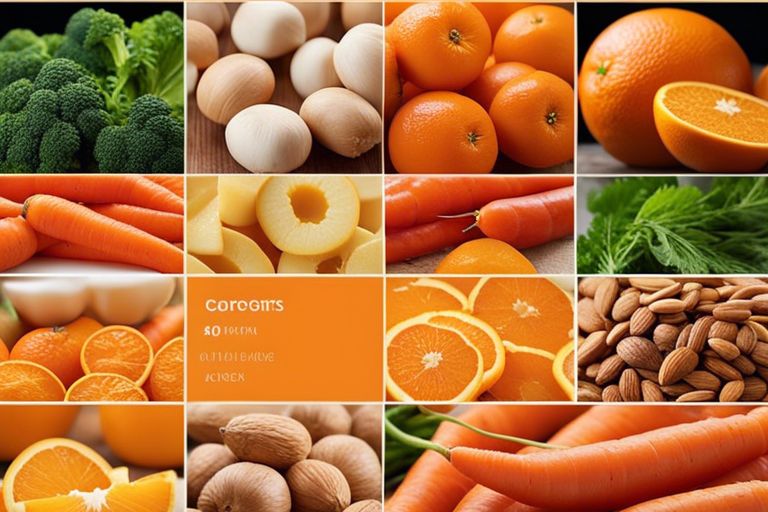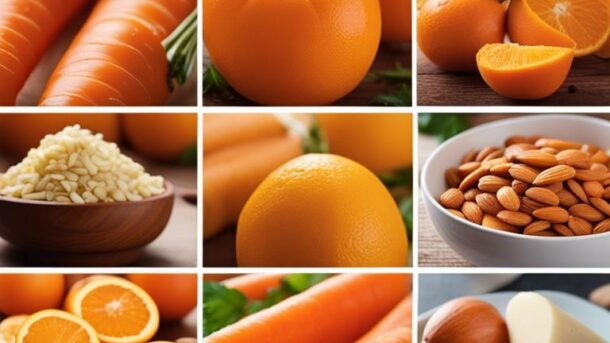It’s time to research into the world of anti-aging foods and understand the importance of vitamins A, C, and E in your daily diet. These vital vitamins play a crucial role in promoting healthy skin, fighting off harmful free radicals, and reducing the visible signs of aging. By incorporating foods rich in vitamins A, C, and E into your meals, you can nourish your skin from the inside out and maintain a youthful glow. Let’s explore how these powerful vitamins can help you achieve radiant and age-defying skin.
Key Takeaways:
- Vitamin A: Helps in the production of collagen, which reduces wrinkles and improves skin texture.
- Vitamin C: Acts as an antioxidant, protecting the skin from damage caused by free radicals and reducing the appearance of wrinkles.
- Vitamin E: Helps repair and protect the skin from sun damage, promoting cell regeneration and maintaining skin elasticity.

The Role of Vitamins in Anti-Aging
For more information on the importance of vitamins in anti-aging, you can check out The Fat-Soluble Vitamins: A, D, E and K. Vitamins play a crucial role in maintaining skin health and slowing down the aging process. Specifically, vitamins A, C, and E are known for their anti-aging properties and their ability to protect the skin from damage caused by environmental factors.
Vitamin A: The Antioxidant Powerhouse
The powerhouse of antioxidants, Vitamin A, helps in repairing skin tissues, maintaining healthy skin, and reducing the appearance of wrinkles and fine lines. It promotes cell turnover, which is imperative for achieving that youthful glow. Include foods rich in Vitamin A such as carrots, sweet potatoes, and kale in your diet to harness its anti-aging benefits.
Vitamin C: The Collagen Booster
An imperative nutrient for collagen production, Vitamin C plays a significant role in keeping your skin firm and youthful. It also helps in protecting the skin from sun damage and reducing hyperpigmentation. Including Vitamin C-rich foods like oranges, strawberries, and bell peppers in your diet can help boost collagen synthesis and improve skin elasticity.
Booster
Vitamin E: The Free Radical Fighter
With its powerful antioxidant properties, Vitamin E is your skin’s best defense against free radicals that can cause premature aging. It helps in improving skin texture, reducing inflammation, and promoting skin repair. Incorporate Vitamin E-rich foods like almonds, sunflower seeds, and spinach into your diet to support your skin’s health and combat signs of aging.
Plus

Food Sources of Vitamins A, C, and E
You can learn more about the importance of Vitamins A, C, and E in anti-aging foods by reading this Vitamins A, C and E | Uses, side-effects informative guide.
Vitamin A-Rich Foods: Sweet Potatoes, Carrots, and Dark Leafy Greens
For a healthy dose of Vitamin A, incorporate foods like sweet potatoes, carrots, and dark leafy greens into your diet. These foods are rich in beta-carotene, a precursor to Vitamin A, which is crucial for maintaining good vision, skin health, and immune function.
Vitamin C-Rich Foods: Citrus Fruits, Berries, and Bell Peppers
Vitamin C is a powerful antioxidant that helps protect your skin from aging by fighting free radicals. Citrus fruits, berries, and bell peppers are excellent sources of Vitamin C that you can easily include in your daily meals.
To boost your collagen production and keep your skin looking youthful, make sure to include Vitamin C-rich foods like citrus fruits, berries, and bell peppers in your diet.
Vitamin E-Rich Foods: Nuts, Seeds, and Vegetable Oils
Food sources rich in Vitamin E include nuts, seeds, and vegetable oils. Vitamin E acts as an antioxidant, protecting your cells from damage caused by free radicals. Including these foods in your diet can help promote healthy skin and reduce the signs of aging.
A diet rich in Vitamin E from nuts, seeds, and vegetable oils can help protect your skin from UV damage and maintain its youthful appearance. Incorporate these foods into your meals for added anti-aging benefits.
How Vitamins A, C, and E Combat Aging
Reducing Oxidative Stress and Inflammation
All three vitamins—A, C, and E—play crucial roles in combating aging. An crucial mechanism through which they achieve this is by reducing oxidative stress and inflammation in your body. Oxidative stress occurs when there is an imbalance between free radicals and antioxidants in your system, leading to cell damage and aging. Vitamins A, C, and E act as powerful antioxidants, neutralizing these harmful free radicals and protecting your cells from damage.
Protecting Skin Collagen and Elasticity
One of the key benefits of vitamins A, C, and E in anti-aging foods is their ability to protect your skin’s collagen and elasticity. Collagen is a protein that provides structure to your skin, while elasticity allows it to stretch and bounce back. Vitamin A promotes cell turnover and helps maintain healthy skin. Vitamin C is crucial for collagen production, helping to keep your skin firm and smooth. Vitamin E acts as a potent moisturizer, protecting your skin from drying out and maintaining its elasticity.
Understanding the importance of these vitamins can help you make better choices when it comes to your diet and skincare routine, ultimately supporting your skin’s health and youthful appearance.
Enhancing Cellular Health and Longevity
An additional way that vitamins A, C, and E combat aging is by enhancing cellular health and longevity. These vitamins work at the cellular level to support proper functioning, repair damage, and promote longevity. Vitamin A aids in gene expression and cell differentiation, Vitamin C supports immune function and helps repair tissues, and Vitamin E protects cell membranes from damage. By including foods rich in these vitamins in your diet, you can support your cells in functioning optimally and potentially slow down the aging process.
Health is not just about the absence of disease but also about supporting your body’s natural processes to thrive and maintain vitality. By incorporating foods rich in vitamins A, C, and E into your diet, you can nourish your cells, protect your skin, and combat aging from the inside out.

The Synergistic Effects of Vitamins A, C, and E
Combating Age-Related Diseases: Cancer, Cardiovascular Disease, and Cognitive Decline
Not only do vitamins A, C, and E individually play crucial roles in combating age-related diseases, but when combined, their synergistic effects are even more remarkable. Cancer, cardiovascular disease, and cognitive decline are some of the major health concerns associated with aging, and the combined antioxidant properties of these vitamins can help in reducing the risk of developing these conditions.
Supporting Immune Function and Detoxification
Age-related decline in immune function and the body’s detoxification processes can leave you more vulnerable to illnesses and toxin buildup. By including foods rich in vitamins A, C, and E in your diet, you can support your immune system and enhance the body’s detoxification pathways for overall better health.
The synergistic effects of these vitamins can help in boosting your immune response to pathogens and aiding in the removal of harmful toxins from your body, thus promoting a stronger and more resilient system.
Promoting Healthy Aging and Well-being
Diseases associated with aging can significantly impact your quality of life, but incorporating vitamins A, C, and E into your diet can help in promoting healthy aging and overall well-being. These three vitamins work together to counteract the effects of oxidative stress, inflammation, and other mechanisms that contribute to aging-related conditions.
Cardiovascular health is also crucial for overall well-being, and the combined effects of vitamins A, C, and E can help in maintaining a healthy heart and blood vessels, reducing the risk of cardiovascular diseases as you age.
Dietary Recommendations for Optimal Vitamin Intake
Incorporating Vitamin-Rich Foods into Your Diet
Foods rich in vitamins A, C, and E are vital for maintaining youthful skin and overall health. To ensure you are getting an adequate amount of these vitamins, incorporate a variety of colorful fruits and vegetables into your daily meals. Carrots, sweet potatoes, oranges, strawberries, bell peppers, almonds, and sunflower seeds are excellent sources of these vitamins. You can easily add them to your salads, smoothies, or snack on them throughout the day.
Supplements: When and How to Use Them
Dietary supplements can be useful if you have trouble meeting your daily vitamin requirements through food alone. However, it’s important to consult with a healthcare provider before starting any supplement regimen. Supplements should not replace a healthy diet but rather complement it when needed. Vitamin supplements are best absorbed when taken with a meal that contains healthy fats, as vitamins A, C, and E are fat-soluble vitamins.
When choosing a supplement, opt for high-quality brands that have been tested by a third-party organization to ensure their safety and efficacy. Remember that more is not always better when it comes to vitamins, so stick to the recommended daily dosage unless advised otherwise by your healthcare provider.
Avoiding Deficiencies and Interactions
Avoiding deficiencies in vitamins A, C, and E is crucial for maintaining your skin’s health and overall well-being. Keep in mind that consuming excessive amounts of these vitamins can also have adverse effects on your health. It’s vital to strike a balance and not overdo it with vitamin supplements.
With the wide variety of foods available that are rich in these vitamins, you can easily meet your daily requirements through a balanced diet. Do not forget, it’s always best to get your nutrients from whole foods rather than relying solely on supplements.
The Future of Anti-Aging Research
Unlike the past, where anti-aging research primarily focused on topical treatments and cosmetic procedures, the future of anti-aging research is shifting towards a deeper understanding of how nutrition and genetics play a crucial role in the aging process. Emerging trends in vitamin research are shedding light on the importance of specific vitamins like A, C, and E in combating the signs of aging from within.
Emerging Trends in Vitamin Research
With advancements in technology and research methodologies, scientists are delving into the intricate mechanisms through which vitamins A, C, and E can protect against oxidative stress, inflammation, and cellular damage that contribute to aging. Studies are revealing how these vitamins work synergistically and in combination with other nutrients to enhance their anti-aging effects.
The Potential of Personalized Nutrition and Genomics
For personalized nutrition and genomics, the future holds immense potential in customizing anti-aging diets tailored to individual genetic profiles. It is projected that understanding your unique genetic makeup can help pinpoint specific vitamin deficiencies or requirements that may influence how your body ages and responds to dietary interventions, offering a more targeted approach to anti-aging strategies.
It is believed that personalized nutrition based on genomics can optimize the efficacy of vitamins A, C, and E in anti-aging foods by aligning them with your genetic predispositions and metabolic pathways. This personalized approach may lead to more precise recommendations on vitamin intake and dietary patterns that can support healthy aging and longevity based on your genetic blueprint.
The Role of Vitamins in Preventive Medicine
The future of preventive medicine is intertwined with the role of vitamins A, C, and E in preserving overall health and vitality as you age. Research suggests that incorporating these vitamins into your diet not only helps in combating visible signs of aging but also plays a crucial role in preventing age-related diseases such as cardiovascular conditions, cognitive decline, and certain cancers.
The potential benefits of vitamins A, C, and E go beyond skin-deep beauty, extending into preventive medicine where these micronutrients act as powerful antioxidants and immune boosters, safeguarding your health from the inside out. By prioritizing these vitamins in your anti-aging regimen, you can fortify your body’s defense mechanisms and enhance your resilience against the effects of time.
Summing up
Considering all points, it is evident that vitamins A, C, and E play crucial roles in maintaining youthful skin and overall health. Vitamin A helps to promote cell turnover and collagen production, vitamin C is an antioxidant that protects the skin from sun damage and boosts collagen synthesis, and vitamin E helps to protect against oxidative stress and inflammation. By incorporating foods rich in these vitamins into your diet, you can help slow down the aging process and keep your skin looking radiant and healthy.
So, next time you’re planning your meals, remember to include a variety of colorful fruits and vegetables, nuts and seeds, and healthy fats like avocado and olive oil to ensure you’re getting a good amount of vitamins A, C, and E. Your skin and body will thank you for the nourishment and protection these nutrients provide, helping you age gracefully and maintain a vibrant appearance for years to come.
Q: What is the significance of vitamin A in anti-aging foods?
A: Vitamin A is crucial for maintaining healthy skin, as it helps repair skin tissues and prevent premature aging. It also promotes collagen production, which helps reduce the appearance of wrinkles and fine lines.
Q: How does vitamin C contribute to anti-aging effects in foods?
A: Vitamin C is a powerful antioxidant that helps protect the skin from free radical damage caused by UV rays and environmental pollutants. It also boosts collagen synthesis, brightens the skin, and reduces the visibility of age spots.
Q: What role does vitamin E play in anti-aging foods?
A: Vitamin E is known for its moisturizing properties and ability to strengthen the skin’s barrier function. It protects against sun damage, reduces inflammation, and promotes skin repair, making it a vital nutrient for maintaining youthful and healthy skin.



